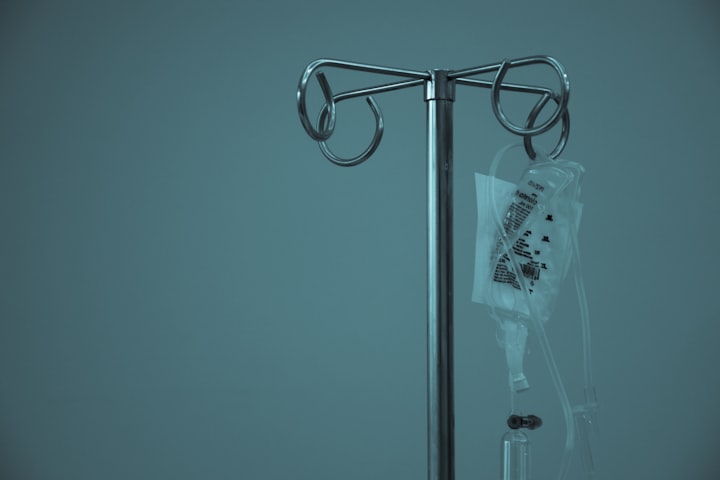Deposits
By Owen Schaefer

The first week of chemo, Peter sits by you and rambles about everything and nothing for the sake of distraction. You’ve just learned about the money dumped into your bank account — twenty-thousand pounds that isn’t yours. It’s been there for two weeks, which shows how often you bother to check. The bank app labels it a deposit, but it’s a mistake.
“Some kind of clerical error,” Peter says. “Has to be. Or someone depositing to the wrong account. If it was gift...I mean, who does that? No one. No one would deposit that much money and not tell you. Right?”
Peter’s gaze flits from the floor to the television to the door as he is speaking. He’s not avoiding your face; he’s avoiding staring at the blue cannula on the back of your hand, or the soft stubble of your head, which you shaved just yesterday. You did it yourself with an electric shaver that you bought for the purpose. You wanted to take control of this one thing. To choose it.
“We should call the bank and ask,” Peter says.
You crest a minor wave of nausea. If the Zofran is working, you dread to think what it would be like without it. Unfortunately, it also makes you tired and sluggish while the steroids jolt you into a kind of caffeine high. The mix of the two touches everything with a sense of the unreal.
“Peter, babe, I just can’t think about this. The money will probably be gone next week. If not, then hurrah. Okay?”
“Sure, but what if it’s some kind of money laundering thing? You know, a lot of banks don’t even allow third-party cash deposits anymore. And this is why. We really need to call them.”
You hold up your hand like a crossing guard. The cannula gives a dull throb.
“Can you please just stop?”
“Okay, I’m sorry,” he says. His gaze darts to your hand, the tape, the tube. He adopts an unhappy smile.
“Magazine?”
Peter has packed the carry-bag with design magazines, novels and snacks. The laptop is full of movies you planned to watch before the diagnosis. He has also given you a journal — one of those black notebooks with the elastic closure and a ribbon to keep your place. He says writing down your emotional states as they come and go will help with anxiety. It’s something he’s read somewhere on a cancer-survivor site. The flood of hospital life-hacks is more his way of coping than yours. You are dubious about the book, but you’ve begun to write in it anyway. Just dates and words: 14th of May. Nauseous. Tired and angry. Betrayed by my own body.
You do this for him as much as for yourself. You hope if he sees you writing, he will stop looking at you like something about to expire — a wilting houseplant. A rainbow fading away in the sun.
* * *
In the end, the novels and magazines go unread. You find that the clinic has a bustle of its own, and the time passes quickly. Someone is always arriving or leaving. Always a flurry of greetings. Always a neighbour with advice or questions. Always a discussion about whatever’s on the TV. Always a nurse or technician checking drip levels and tubes, bringing blankets, making jokes about drugs and cocktails.
“If I live,” you say to Peter, “Remind me never to drink another cocktail.”
You’re hoping for a laugh, but he just glares and tells you not to be morbid. “You’re going to be fine,” he says.
And after six weeks, you are finished.
There are follow-up consultations. Several. More drugs, and more follow-ups. And then, the oncologist says he’ll see you in three months, and that your five-year outlook is great. He says he isn’t terribly concerned. You only hear the word terribly. And five years.
The five-year mark. It is that first, best target. You picture it stretching ahead like a dark road. Before all of this started — before words like non-metastatic and cystectomy and the names of fifteen different drugs became a part of your everyday language — you and Peter had talked about a big vacation. Switzerland maybe, or Italy. Just book time off and buy a ticket. But now? Now, time has come unglued. Everything seems both too short and too long. Even plans for the weekend seem impractical. Extravagant.
In your journal you write: 2nd of July, I am empty. Suspended. Five years. All plans now measured against that milestone. Do we buy a house? Take a trip? Have children!?
No, not like this.
* * *
You stand in front of the closet, dressed for work. You’ve folded your best suit-jacket over your arm. It smells faintly of disuse. You’ve told the office you’re ready to get back. Management has been faultless through all of this. Stood by you. Promised you could take all the time you need. And you’ve read enough survivor horror stories about employers that you feel like you need to repay yours just for being decent human beings.
Peter is in the toilet, shaving. He shouts through the door:
“Hey, is the money still there? That mystery money in your account?”
“Haven’t looked.”
There is the sound of something clattering into the sink and Peter cursing. Then the electronic tick, tick, tick of his phone’s keypad.
“It’s still there!” he shouts, his voice echoing against the tile.
You put on the jacket. It feels larger than you remember. Heavier.
“Did you hear me?” he asks, coming out shirtless, half-shaven.
“So? If you’re worried about it, don’t spend it.”
“Well, obviously! I’ll call them today. It’s ridiculous.”
“You do that. I have to go.”
Peter snaps out of his outrage and puts his arms around your waist. He pecks you on the nose, transferring a dab of shaving cream which he then wipes away with his finger.
“What are you like,” you mutter. But you smile for the first time this morning.
“Good luck, today, babes. You’ll be all right.”
“Yeah.”
* * *
You are surprised at how little has changed. You almost expected peeling paint, moss growing between the floor tiles. But you have not been gone for a century, only two months. Everyone is perfectly polite, almost sickeningly so. You feel their eyes on your too-short hair. At your desk, you perform the ritual of setting out personal trinkets — the Hawaii magnet from your honeymoon; the photo of you with your arm around Mum on her seventieth birthday; a little money plant Peter gave you to “liven up the space.” Yet somehow, even as you sit here catching up on chains of e-mails and filling your calendar with client meetings, something feels wrong.
Around lunchtime, you go to the toilets and look in the mirror. Your hair, short as it is, has become thicker and has a slight curl, now. They told you this can happen, but you don’t like it. Don’t recognize it as your own. You touch your face, and the woman in the mirror does the same. She is gaunt. Haunted. Distant. You don’t know her.
Your vision blurs, your heart-rate skyrockets. You turn from the mirror, stagger into a cubicle and lock yourself in. Two hours pass before someone comes looking.
* * *
That evening, at home, you write in the journal again: 16th of July. Heart palpitations at work. Cold sweat. Panic attack? Heart attack? Still four years and ten months left. I can't do this.
“I called the bank,” says Peter. “They’re looking into it. The money.”
You sigh. Close the book.
“Babe? I don’t care.”
He looks at you, incredulous.
“Honestly,” you say. “I just don’t give a shit. We don’t need the money. We didn’t ask for it. It has nothing to do with us.”
“What if it’s some kind of scam? We spend it, and then the person that put it there demands it back? Could they do that? The bank says it was a legitimate deposit, but they won’t tell me who! I just keep waiting for the other shoe to drop.”
He’s getting worked up now, pacing.
“I can’t deal with it. This money hanging over our heads,” he says before stamping out to the kitchen.
You open the journal again and read over your entries. They are short. Overwhelmingly negative. Is this depression? Is this how it begins? You remember Peter texting you statistics about cancer patients and depression. What had it been? Fifteen percent? Twenty? You open the journal to a blank page and draw a sword pointing downward, dangling from a string which runs off the top of the paper. Next to it, you write: Things hanging over me — Five years of waiting. Cancer. Death. Having no children. Loss of respect. The expectation to be fine. …Depression?
Then: Things hanging over Peter: Twenty-thousand pounds.
* * *
Two days later, in the shower, you find a lump in your armpit.
You stand there, one arm against the wall, body half covered in soap, pressing it, moving it with your fingers. The floor of the shower seems to sag beneath you. Your heart batters at your ribcage. You draw one shuddering breath, sink to the floor and begin to cry — the water hot and raw on your skin.
When you tell Peter, he examines the spot then curses and punches the wall. You flinch and feel a flush of anger, but you’re too weary to say anything. You can’t call the oncologist until morning, but Peter tries anyway, then swears at the recording and storms out of the room. You hear him pacing the apartment as you sit on the bed and try not to prod at the thing. Try not to think about how long it might have been there. You are no longer crying. Just numb.
Peter returns after a few minutes, calmer. And you wait for his patter, his steady assurances. Instead, he sits down and pulls you into him. You let yourself collapse there — his collar bone hard against your temple, his face buried in your still-damp hair. His shirt smells of sweat and deodorant and laundry-soap. He doesn’t say, It’s going to be okay. He just stays still with you. You feel his body begin to quake, hear his breath go ragged with sobs.
In the early hours of the morning, when Peter has finally fallen asleep, you carry the journal into the living room and tear out the page with the sword, binning it. You write: 18th of July, Found lump. Abject terror.
You sift through yourself, then, trying to pin down any other emotion. But the only one you can settle on feels so out of place that you refuse to write it down.
You feel a terrible sense of relief.
* * *
It takes ten days. There is a storm of consultations and tests, and an overnight in-patient surgery. And when the biopsy results come back, the doctor beams at you. It is a fibroadenoma. Entirely benign. Just one more unwanted thing deposited where it shouldn't be. The stitches sting when you try to reach above your head. There will be another tiny scar.
You and Peter leave the hospital together. Happy. Dazed. His arm is around your shoulders. The day is hot and humid and you’ve both begun to sweat, but you don’t pull away from him until you reach the car.
Inside, with the air-conditioning blasting against your arms, you look at Peter and say,
“Is that money still there?”
“Your account? Yes. Still there.”
“Then it’s ours,” you say, staring straight ahead.
“I guess. But, what if—”
You cut him off with a hand on his arm. “It’s ours.”
Peter shoots you a confused look, but pulls the car out onto the road. You open your journal in your lap and write: 29th of July, Relief. Apprehension. Joy. Today, I buy tickets to Zurich. ◼︎
About the Creator
Owen Schaefer
Owen Schaefer is a Canadian writer, editor and playwright living in the U.K. He writes fiction, speculative fiction, and breezy articles on writing, AI, and other nonsense. Attacks of poetry may occur.
More at owenschaefer.com






Comments
There are no comments for this story
Be the first to respond and start the conversation.